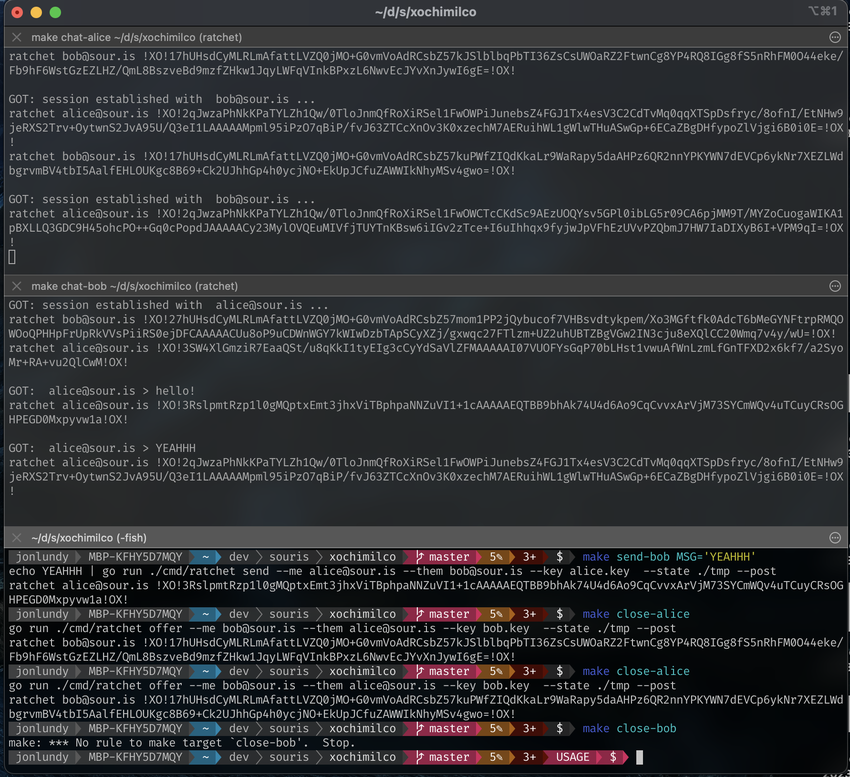
Very cool. I like the chain rules. I wonder how it performs against lextwt.
making a note here to check this out.
go mills() 😅
@chunkimo@twtxt.net lol. go walrus!!
go mills() 😅
So. Some bits.
i := fIndex(xs, 5.6)
Can also be
i := Index(xs, 5.6)
The compiler can infer the type automatically. Looks like you mention that later.
Also the infer is super smart.. You can define functions that take functions with generic types in the arguments. This can be useful for a generic value mapper for a repository
func Map[U,V any](rows []U, fn func(U) V) []V {
out := make([]V, len(rows))
for i := range rows { out = fn(rows[i]) }
return out
}
rows := []int{1,2,3}
out := Map(rows, func(v int) uint64 { return uint64(v) })
I am pretty sure the type parameters goes the other way with the type name first and constraint second.
func Foo[comparable T](xs T, s T) int
Should be
func Foo[T comparable](xs T, s T) int@prologic@twtxt.net I always liked bit.
I am disappointed that a GUI app would not at least have screenshots.
@prologic@twtxt.net it is from the generator. But in the actual go implementation methods are represented with a unsigned short. So 65k is the hard limit in go.
@eldersnake@we.loveprivacy.club apparently someone that generates graphql endpoints for a biiiig app
@prologic@twtxt.net @prologic@twtxt.net this description is applicable. As with PH.D so with this hyper focus.
Oof.

its not that you are dumb.. just that you are not hyperfocused into a very specific domain of knowledge.

Ratchet CLI now supports salty or ratchet comms!
@prologic@twtxt.net I get the worry of privacy. But I think there is some value in the data being collected. Do I think that Russ is up there scheming new ways to discover what packages you use in internal projects for targeting ads?? Probably not.
Go has always been driven by usage data. Look at modules. There was need for having repeatable builds so various package tool chains were made and evolved into what we have today. Generics took time and seeing pain points where they would provide value. They weren’t done just so it could be checked off on a box of features. Some languages seem to do that to the extreme.
Whenever changes are made to the language there are extensive searches across public modules for where the change might cause issues or could be improved with the change. The fs embed and strings.Cut come to mind.
I think its good that the language maintainers are using what metrics they have to guide where to focus time and energy. Some of the other languages could use it. So time and effort isn’t wasted in maintaining something that has little impact.
The economics of the “spying” are to improve the product and ecosystem. Is it “spying” when a municipality uses water usage metrics in neighborhoods to forecast need of new water projects? Or is it to discover your shower habits for nefarious reasons?
@prologic@twtxt.net short version: context is a linked list that is passed down a call stack that can share timeout, cancellation, or other data as needed by lower functions in the call stack.
@prologic@twtxt.net the rm -rf is basically what go clean -modcache does.
I think you can use another form that will remove just the deps for a specific module. go clean -r
it could have been some with running out of disk space for my twt cache.
probably some now that the free COVID loans that required staffing numbers are over the staffing is no longer needed.
Business pushing for recession. They all over hired during the pandemic to meet higher traffic levels and now those levels are dropping back to normal. absolutely bad resource planning all around.
interesting that in my pod this is showing in reply to something.. but in the twtxt is has no subject.

@prologic@twtxt.net The parse is correct. this seems to be something with the markdown render.
The parse is correct. this seems to be something with the markdown render.
I remember when doing this process with my wife. During the halfway point we brought all sorts of documentation to show commingling of assets and showing we had “built a life together” .. we get to the interview and they just ask if we have a Costco card together. :|
good luck to you!
pass on my machine:
@abucci@anthony.buc.ci So.. The issue is that its showing the password by default? Would making an alias to always include the -c help? We can probably engage Jason with a PR to enable a more hardened approach when desired. I’ve spoken to him before and is generally a pretty open to ideas.
I found this app that was created by the gopass author that does copy by default and has a tui or GUI mode https://github.com/cortex/ripasso
@mckinley@twtxt.net i use pass along with the android and browser-pass clients. it is very good and keeping in sync is pretty simple.
@mckinley@twtxt.net very weird things going on for me.. i can see your twt but its not showing up as a reply or fork? 
i am curious why I only get 5 twts in yarn when they have several more on the feed. so something isnt parsing right.
@abucci@anthony.buc.ci i have an old copy of the 2005 version from university if you want to give it a read through. its quite dry.
i have one box with virmach that is something like 3 vcpu 5.88g ram and 15g disk. for $29/year.
!XO!1GcUL/ZbHj+CZnedB67ddd0tt3y1ppSLY7wbzMhraUeubCUH8LRT61pz6jPyOEa2wYYupwP7tu1cwR9mNN/k+No7PEw13kqBy6YvDU8jettw25Lkj3gZ+R4J1q6d0GWKKGx+OsYmJMPev7BL+5SCnt08qQYmgGAVhyhJZMkndIgk=!OX!
@prologic@twtxt.net yap. This was an offer message to you. rachet-over-yarn mode enabled!
@prologic@twtxt.net vultr pricing is low. But it can be lower if you shop the less fancy admin ui sites like virmarch or ovh. There are some bare metal that cost way less.. Though the experience is less than optimal.
@abucci@anthony.buc.ci ISO 27001 is basically the same. It means that there is management sign off for a process to improve security is in place. Not that the system is secure. And ITIL is that managment signs off that problems and incidents should have processes defined.
Though its a good mess of words you can throw around while saying “management supports this so X needs to get done”
@prologic@twtxt.net !XO!1GcUL/ZbHj+CZnedB67ddd0tt3y1ppSLY7wbzMhraUeubCUH8LRT61pz6jPyOEa2wYYupwP7tu1cwR9mNN/k+No7PEw13kqBy6YvDU8jettw25Lkj3gZ+R4J1q6d0GWKKGx+OsYmJMPev7BL+5SCnt08qQYmgGAVhyhJZMkndIgk=!OX!
@prologic@twtxt.net that worked.. But took crazy long time
@prologic@twtxt.net I get this error when replying to yarns. 
@prologic@twtxt.net I have updated to kinda follow this. It now redirects to other webfingers if the resource has a different hostname. I’m still not sure what I should put multiple services with the same domain name. Like if they were to have conflicting properties.
it seems they are following the URN format of a URI where you just prefix things with colons.
urn:example:apple:pear:plum:cherry
@abucci@anthony.buc.ci see here in the okta docs: https://developer.okta.com/docs/reference/api/webfinger/ they are adding a prefix to the acct
so in effect it would look something like this:
---
subject: acct:me@sour.is
aliases:
- salty:me@sour.is
- yarn:xuu@ev.sour.is
- status:xuu@chaos.social
- mailto:me@sour.is
---
subject: salty:me@sour.is
aliases:
- acct:me@sour.is
links:
- rel: self
type: application/json+salty
href: https://ev.sour.is/inbox/01GAEMKXYJ4857JQP1MJGD61Z5
properties:
"http://salty.im/ns/nick": xuu
"http://salty.im/ns/display": Jon Lundy
"http://salty.im/ns/pubkey": kex140fwaena9t0mrgnjeare5zuknmmvl0vc7agqy5yr938vusxfh9ys34vd2p
---
subject: yarn:xuu@ev.sour.is
links:
- rel: https://txt.sour.is/user/xuu
properties:
"https://sour.is/rel/redirect": https://txt.sour.is/.well-known/webfinger?resource=acct%3Axuu%40txt.sour.is
---
subject: status:xuu@chaos.social
links:
- rel: http://joinmastodon.org#xuu%40chaos.social
properties:
"https://sour.is/rel/redirect": https://chaos.social/.well-known/webfinger?resource=acct%3Axuu%40chaos.social
---
subject: mailto:me@sour.is
...
@prologic@twtxt.net Unfortunately the RFC’s are a bit light in this regard. While it makes mention of different kinds of accounts like mailto: or status services.. it never combines them. It does make mention of using redirects to forward a request to other webfingers to provide additional detail.
I am kinda partial to using salty:acct:me@sour.is, yarn:acct:xuu@txt.sour.is, mailto:me@sour.is that could redirect to a specific service. and a parent account acct:me@sour.is that would reference them in some way. either in properties or aliases.
@prologic@twtxt.net That was exactly my thought at first too. but what do we put as the rel for salty account? since it is decentralized we dont have a set URL for machines to key off. so for example take the standard response from okta:
# http GET https://example.okta.com/.well-known/webfinger resource==acct:bob
{
"links": [
{
"href": "https://example.okta.com/sso/idps/OKTA?login_hint=bob#",
"properties": {
"okta:idp:type": "OKTA"
},
"rel": "http://openid.net/specs/connect/1.0/issuer",
"titles": {
"und": "example"
}
}
],
"subject": "acct:bob"
}
It gives one link that follows the OpenID login. So the details are specific to the subject acct:bob.
Mastodons response:
{
"subject": "acct:xuu@chaos.social",
"aliases": [
"https://chaos.social/@xuu",
"https://chaos.social/users/xuu"
],
"links": [
{
"rel": "http://webfinger.net/rel/profile-page",
"type": "text/html",
"href": "https://chaos.social/@xuu"
},
{
"rel": "self",
"type": "application/activity+json",
"href": "https://chaos.social/users/xuu"
},
{
"rel": "http://ostatus.org/schema/1.0/subscribe"
}
]
}
it supplies a profile page and a self which are both specific to that account.
Trying to wrap my head around webfinger..
my first thoughts about it were that a subject of acct:me@sour.is would have a listing of rel’s for the different accounts that are related to me (ie. yarn, salty, twitter, mastodon, etc…)
but maybe my thinking is at the wrong level.. that each of those accounts would be on a subject level and the rels are describing different aspects of that account. so i would have salty:acct:xuu@sour.is, twitter:acct:xuu, mastodon:acct:xuu@chaos.social, yarn:acct:xuu@ev.sour.is and then i could have a main acct:me@sour.is that links them together as aliases.
I found okta will do something similar with its accounts to show as okta:acct:user@domain so maybe I am on to something?
@prologic@twtxt.net What is the SMART reading for the disk?
@abucci@anthony.buc.ci did you know about the chip inside USB-C cables?

https://connectorsupplier.com/usb-type-c-what-you-need-to-know/
some groups have created their own chips that have hidden keyloggers that can phone home over network connections.
restic yet, I can beyond a doubt assure you it is really quite fantastic 👌 #backups
Interesting. Ive been using backupninja with Borg for snapshots.
Huh. I thought I had that one. Must be an unteste regression. Will add it to the list!
Did something chchange with how the discover feed is generated? My pods logout mode now only shows my twts. It used to be all twts from watcher observation like my logged on discover tab. @prologic@twtxt.net
An interesting read about testing code using nullable states instead of mocks.
https://www.jamesshore.com/v2/projects/testing-without-mocks/testing-without-mocks
@prologic@twtxt.net billionaires don’t exist. That many resources tied up by single individuals muck up the whole system.
@prologic@twtxt.net see where its used maybe that can help.
https://github.com/sour-is/ev/blob/main/app/peerfinder/http.go#L153
This is an upsert. So I pass a streamID which is like a globally unique id for the object. And then see how the type of the parameter in the function is used to infer the generic type. In the function it will create a new *Info and populate it from the datastore to pass to the function. The func will do its modifications and if it returns a nil error it will commit the changes.
The PA type contract ensures that the type fulfills the Aggregate interface and is a pointer to type at compile time.
@prologic@twtxt.net so basically you would use cgit + gitbug with some webhooks?
one that i think is pretty interesting is building up dependent constraints. see here.. it accepts a type but requires the use of a pointer to type.
https://github.com/sour-is/ev/blob/main/pkg/es/es.go#L315-L325
I am offended that you did not post your snarky twt.
I learned how to make gopls syntax highlight go templates in VSCodium.
By adding the following to my config
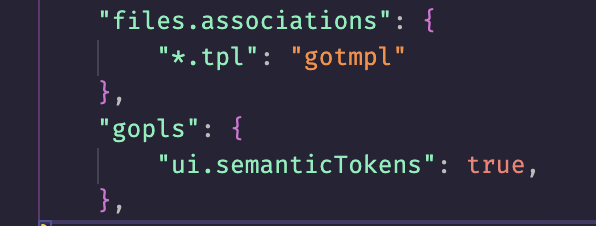
i could go from 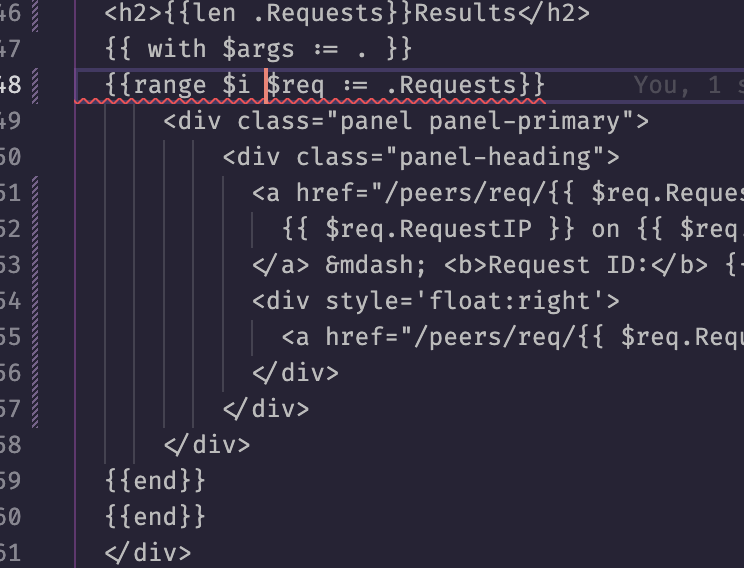 into
into 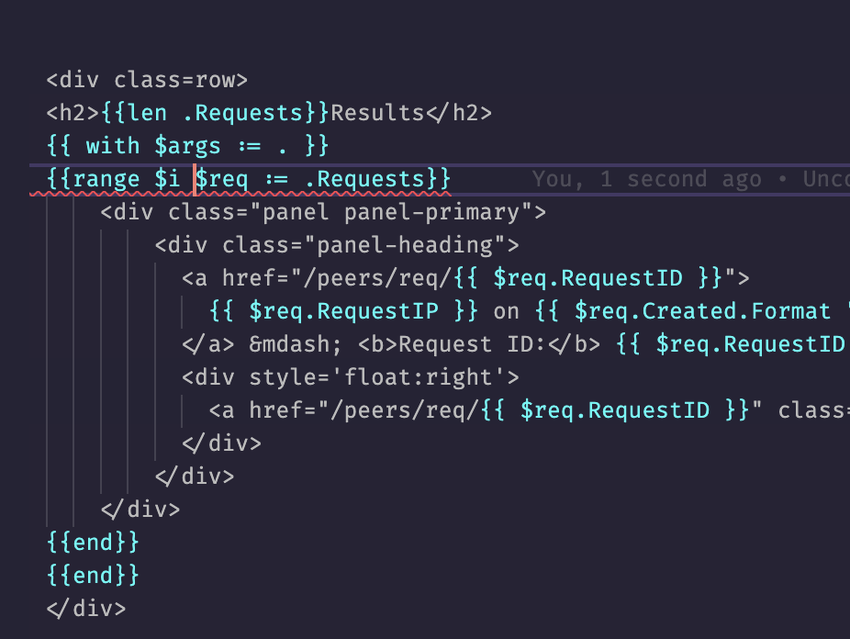
I’ll let the head of the bird site comment on that:

@prologic@twtxt.net its only a Pre-JR dev level.
@prologic@twtxt.net @justamoment@twtxt.net Yep, my back yard security cam. And my poor weather station buried in the snow.
A little late night visitor.
@prologic@twtxt.net NFT non-enthusiast for the #NFT #rebuttal
Is it something to do with implicit declaration of printf?
@prologic@twtxt.net same.
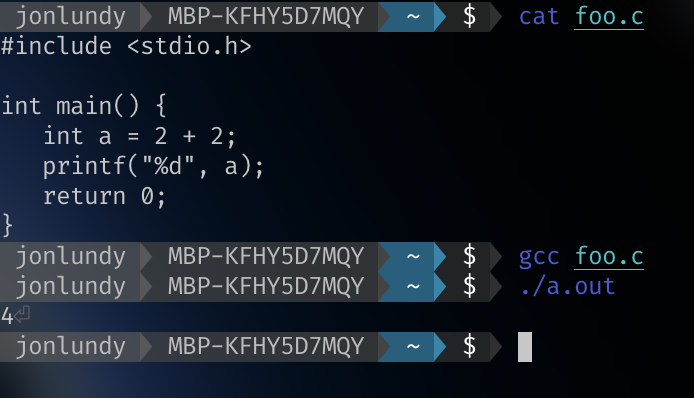
$name$ and then dispatch the hashing or checking to its specific format.
I have submitted this to be used as the hash tooling for Yarn. See it as a good example on using this in a production environment!
@lyse@lyse.isobeef.org anyone willing to copy/paste security related things without understanding are gonna have a bad time.
Logged in using new argon2i password hash! 
@lyse@lyse.isobeef.org Its just dead simple.. and others will salt which makes repeatability in examples a pain.
$name$ and then dispatch the hashing or checking to its specific format.
Circling back to the IsPreferred method. A hasher can define its own IsPreferred method that will be called to check if the current hash meets the complexity requirements. This is good for updating the password hashes to be more secure over time.
func (p *Passwd) IsPreferred(hash string) bool {
_, algo := p.getAlgo(hash)
if algo != nil && algo == p.d {
// if the algorithm defines its own check for preference.
if ck, ok := algo.(interface{ IsPreferred(string) bool }); ok {
return ck.IsPreferred(hash)
}
return true
}
return false
}
https://github.com/sour-is/go-passwd/blob/main/passwd.go#L62-L74
example: https://github.com/sour-is/go-passwd/blob/main/pkg/argon2/argon2.go#L104-L133
$name$ and then dispatch the hashing or checking to its specific format.
Hold up now, that example hash doesn’t have a
$prefix!
Well for this there is the option for a hash type to set itself as a fall through if a matching hash doesn’t exist. This is good for legacy password types that don’t follow the convention.
func (p *plainPasswd) ApplyPasswd(passwd *passwd.Passwd) {
passwd.Register("plain", p)
passwd.SetFallthrough(p)
}
https://github.com/sour-is/go-passwd/blob/main/passwd_test.go#L28-L31
$name$ and then dispatch the hashing or checking to its specific format.
Here is an example of usage:
func Example() {
pass := "my_pass"
hash := "my_pass"
pwd := passwd.New(
&unix.MD5{}, // first is preferred type.
&plainPasswd{},
)
_, err := pwd.Passwd(pass, hash)
if err != nil {
fmt.Println("fail: ", err)
}
// Check if we want to update.
if !pwd.IsPreferred(hash) {
newHash, err := pwd.Passwd(pass, "")
if err != nil {
fmt.Println("fail: ", err)
}
fmt.Println("new hash:", newHash)
}
// Output:
// new hash: $1$81ed91e1131a3a5a50d8a68e8ef85fa0
}
This shows how one would set a preferred hashing type and if the current version of ones password is not the preferred type updates it to enhance the security of the hashed password when someone logs in.
https://github.com/sour-is/go-passwd/blob/main/passwd_test.go#L33-L59
I made a thing. Its a multi password type checker. Using the PHC string format we can identify a password hashing format from the prefix $name$ and then dispatch the hashing or checking to its specific format.
how install gomodot? also.. @prologic@twtxt.net your domain has some pretty strong SEO mojo searching for install "gomodot" puts you on the google first page. 
@lyse@lyse.isobeef.org im talking like some JS projects i have seen with 1-2G node_modules dirs. though yarn is quite vast in its modules because it does a LOOOOOOT of stuff in the background.
@carsten@yarn.zn80.net what type of NAS? I just upgraded my oooold (~2008) Drobo to a Synology. I have been impressed with all the neat stuff it can do.
@eaplmx@twtxt.net i used internet when it cost 13c per minute. my parents would get so mad if i went over the monthly base minutes CompuServe gave us.
@prologic@twtxt.net duud use an ad block on youtube.
(by the way Jesus is born end of September beginning of October)
or August… or Jun-July… or April.. hard to say really.
@prologic@twtxt.net ¯\_(ツ)_/¯
@prologic@twtxt.net “_foo_”
@prologic@twtxt.net “foo”
ahh this is useful https://go.dev/doc/modules/managing-dependencies. the go culture doesn’t typically have large dependency graphs like Ruby or JS.
@prologic@twtxt.net the go get and go mod tidy wont fetch new changes. that’s all a manual affair AFAIK
Ah git-bug! Ive chatted with the creator when he was working on the graphql parts. Its working with git objects directly sorta like how git-repo does code reviews. Its a pretty neat idea for storing data along side the branches. I believe they don’t add a disconnected branch to avoid data getting corrupted by merging branches or something like that.
He says “The college ready foundation send messages of support to all college ready foundation stations all around the world.”
It is a very odd message of support to themselves. But OK.
@prologic@twtxt.net.. hmm and now they are gone. :(
Twting to see if it will update my links list.
@prologic@twtxt.net I’m sure Monroe would like to know about them.
@eaplmx@twtxt.net I didn’t like the original click wheel. I think the first mini wheel was the better of them
I have found the issue with this very subtle bug.. the cache was returning a slice that would be mutated. The mutation involved appending an item and then sorting. because the returned slice is just a pointer+length the sort would modify the same memory.
CACHE Returned slice
original: [A B C D] [A B C D]
add: [A B C D] E [A B C D E]
sort: [E A B C] D [A B C D E]
fix found here:
https://git.mills.io/yarnsocial/yarn/pulls/1072
` `` `
@movq@uninformativ.de yeah.. i rewrote it a few times because i thought there was something breaking.. but was mistaken
though now i am seeing a weird cache corruption.. that seems to come and go.

@lyse@lyse.isobeef.org @prologic@twtxt.net yeah that was how i did it too. I think ill start using the debug version in new stuff since its been added. My comment was around assigning the result of an anonymous function to a a variable.
Tell me you write go like javascript without telling me you write go like javascript:
import "runtime/debug"
var Commit = func() string {
if info, ok := debug.ReadBuildInfo(); ok {
for _, setting := range info.Settings {
if setting.Key == "vcs.revision" {
return setting.Value
}
}
}
return ""
}()
@lyse@lyse.isobeef.org ` `` `
@lyse@lyse.isobeef.org ill check this out.. also.. why the heck is my reply trying to set the subject to #bd3yzvq)
@lyse@lyse.isobeef.org WTH.. i cant reply to this?
@lyse@lyse.isobeef.org interesting… ill look into the parsing on that one
@lyse@lyse.isobeef.org interesting… ill look into the parsing on that one
PSA: DMs on social media sites are not truely PMs. This is why we have a separate tool for private messaging from yarn. Always remember, if you don’t own the infra (or the parts at the ends of e2e encryption) you don’t own the data. and the true owners can view it any way they want!
https://twitter.com/TinkerSec/status/1587040089057759235?t=At-8r9yJPiG6xF17skTxwA&s=19
This is by design due to Google culture. The only way to get promoted into the higher pay scales is to ship a new product. So you have people shipping what worked before without regard to how it will exist within the product ecosystem. Also, why they seem to die off so quickly after launch. see allo and duo for example. The person that launches gets promoted to a higher level and off the original team and so it is left to wither and die.
